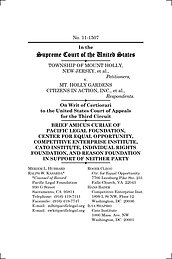Township of Mount Holly v. Mt. Holly Gardens Citizens in Action, Inc.
Learn more about Cato’s Amicus Briefs Program.
“Disparate impact” theory holds someone liable for discrimination for a race-neutral policy that statistically disadvantages a specific racial group — say, blacks score lower on a firefighter-promotion test than whites — even if that negative “impact” was neither foreseen nor intended. The application of this theory has been fraught with controversy, to say the least, but it comes up again and again, in contexts ranging from employment to education to voting. While disparate impact claims have sometimes been sustained under the federal Fair Housing Act (which makes it unlawful to deny housing on the basis of race) since the 1970s, the Supreme Court has only recently agreed to decide whether these claims are lawful. Two years ago, the Court was about to hear such a case, Magner v. Gallagher, when the Justice Department, led by now-Labor Secretary Tom Perez, pressured the city of St. Paul, Minnesota to settle it. The same sort of political pressure is now being brought to bear on Mount Holly Township, New Jersey; supporters of disparate impact theory don’t think that it can survive legal scrutiny. The current case involves a redevelopment plan for a blighted Mount Holly neighborhood (“the Gardens”) that would have transformed the neighborhood into mid-range single-family dwellings. The Gardens’ current residents sued, arguing that the redevelopment plan violated the FHA because a majority of them would not be able to afford the new homes. The district court dismissed this argument, holding that the redevelopment plan affected Gardens residents equally, without regard to race, and was tied only to economic considerations. The court of appeals reversed that ruling, holding that the residents’ association had set out a case of discrimination under the theory of disparate impact because a majority of the affected residents were non-white. Cato has now joined the Pacific Legal Foundation and four other public-interest organizations on an amicus brief arguing not only that disparate impact claims are impermissible under the text of the FHA, but that such claims force unconstitutional actions when applied to governments. Before putting race-neutral policies into effect, government agencies would have to determine whether a particular racial group would be disproportionately impacted and take steps to remedy that difference. By mandating an equality of ends — as opposed to an equality of opportunity — disparate impact liability encourages the adoption of discriminatory quota systems. Moreover, allowing disparate impact claims under the FHA undermines market stability. If a racial minority group is statistically less likely to meet the income requirements necessary to secure a mortgage, banks face a cruel choice: keep the race-neutral policy and risk lawsuits or give unqualified applicants loans and risk mass default (and lawsuits for disparately bankrupting that same minority group). Tort law is only morally justified when a defendant has to compensate his victim for harm he inflicted, whether through malice or negligence. Under the theory of disparate impact, however, a defendant is forced to pay for harm caused not by his own actions, but by economic and statistical realities that he cannot control. The Gardens’ residents can’t afford the new housing not because of their race but because of their poverty. While it’s a harsh truth that a disproportionate number of minorities live in poverty, claiming that making expensive products is racist and that these “racists” have an obligation to compensate the victims of poverty is absurd. The FHA was intended, in the words of Senator Walter Mondale, “to permit people who have the ability to do so to buy any house offered to the public if they can afford to buy it. It would not overcome the economic problem of those who could not afford to purchase the house of their choice.” For following the law as it was written, and attempting to improve a blighted neighborhood, Mount Holly was rewarded with a decade’s worth of vexatious litigation — which the Supreme Court should now end once and for all.
